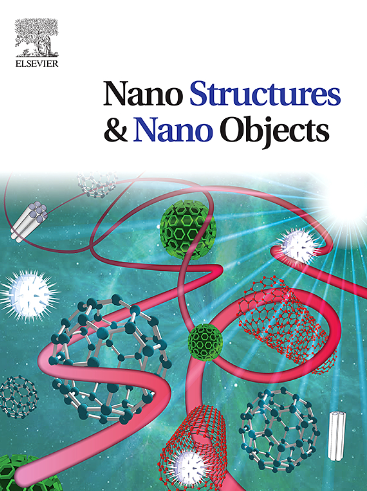用腰果树胶稳定的二氧化钛纳米结构去除新兴污染物的绿色技术透视
IF 5.45
Q1 Physics and Astronomy
引用次数: 0
摘要
寻找应对染料和药物等新兴污染物的技术是一项艰巨的任务。植物多糖已被用来合成光催化剂,作为绿色技术的策略。本研究旨在利用腰果树胶合成 TiO2 纳米结构光催化剂。研究人员对腰果树胶进行了结构、形态和光学表征,以验证腰果树胶对纳米结构生长的影响。在紫外线照射下,对亚甲基染料(MB)和布洛芬(IBP)污染物进行了光催化测试。结构表征显示形成了锐钛矿型二氧化钛,其带隙为 3.15 eV。使用 CGT 进行的光催化试验表明,与 IBP(29.86%)相比,该材料去除甲基溴(43.17%)的效率更高。此外,清除剂研究表明,电子是参与染料降解的物种。因此,使用树胶获得的二氧化钛纳米粒子去除污染物的结果是有希望的。本文章由计算机程序翻译,如有差异,请以英文原文为准。
Insight into the TiO2 nanostructures stabilized with cashew tree gum to remove emerging contaminants as a green technology
Searching for technologies to combat emerging pollutants such as dyes and pharmaceuticals is arduous. Plant polysaccharides have been used to synthesize photocatalysts as strategies for green technology. The present study aimed to synthesize TiO2 nanostructure photocatalytic using cashew tree gum. Structural, morphological, and optical characterization was carried out to verify the gum's effect on the growth of nanostructures. Photocatalytic tests were performed with Methylene dye (MB) and Ibuprofen (IBP) pollutants under UV irradiation. Structural characterization demonstrated the formation of anatase-type TiO2, with a band gap at 3.15 eV. Photocatalytic assays using CGT showed that the material was more efficient in removing MB (43.17 %) when compared to IBP (29.86 %). In addition, scavenger studies indicated that electrons are the species involved in dye degradation. Therefore, the results are promising for using TiO2 nanoparticles obtained with gum to remove pollutants.
求助全文
通过发布文献求助,成功后即可免费获取论文全文。
去求助
来源期刊

Nano-Structures & Nano-Objects
Physics and Astronomy-Condensed Matter Physics
CiteScore
9.20
自引率
0.00%
发文量
60
审稿时长
22 days
期刊介绍:
Nano-Structures & Nano-Objects is a new journal devoted to all aspects of the synthesis and the properties of this new flourishing domain. The journal is devoted to novel architectures at the nano-level with an emphasis on new synthesis and characterization methods. The journal is focused on the objects rather than on their applications. However, the research for new applications of original nano-structures & nano-objects in various fields such as nano-electronics, energy conversion, catalysis, drug delivery and nano-medicine is also welcome. The scope of Nano-Structures & Nano-Objects involves: -Metal and alloy nanoparticles with complex nanostructures such as shape control, core-shell and dumbells -Oxide nanoparticles and nanostructures, with complex oxide/metal, oxide/surface and oxide /organic interfaces -Inorganic semi-conducting nanoparticles (quantum dots) with an emphasis on new phases, structures, shapes and complexity -Nanostructures involving molecular inorganic species such as nanoparticles of coordination compounds, molecular magnets, spin transition nanoparticles etc. or organic nano-objects, in particular for molecular electronics -Nanostructured materials such as nano-MOFs and nano-zeolites -Hetero-junctions between molecules and nano-objects, between different nano-objects & nanostructures or between nano-objects & nanostructures and surfaces -Methods of characterization specific of the nano size or adapted for the nano size such as X-ray and neutron scattering, light scattering, NMR, Raman, Plasmonics, near field microscopies, various TEM and SEM techniques, magnetic studies, etc .
 求助内容:
求助内容: 应助结果提醒方式:
应助结果提醒方式:


